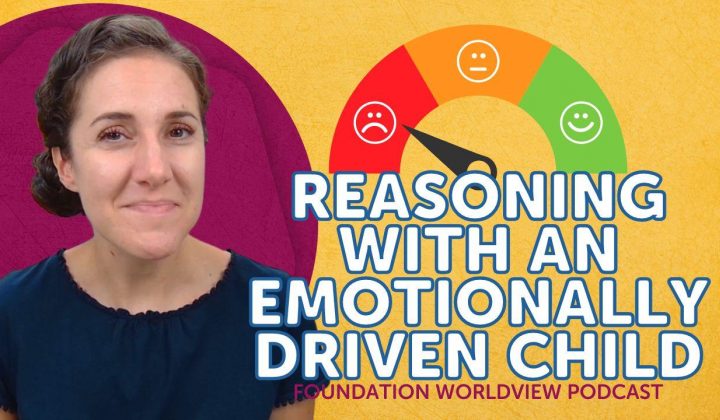Learn more about the journey that led to us equipping kids to carefully evaluate every idea they encounter.
Meet members of our team who have contributed to curriculum development.
Hear from real users of the Foundation Curriculum.
Learn what we believe about God, Jesus, Scripture, and more.
When Kids Start Doubting Faith: How to Respond
Hello, friends! Today's question is such an important one:
"How would you instruct a child who is very familiar with the Bible but is now questioning whether it’s fictional—and whether God, Jesus, and the Holy Spirit are real?"
First, to the person who sent in this question—I imagine you might be feeling discouraged. You've invested so much time pouring Scripture into this child, helping them understand God’s Word, and now they’re starting to question it all.
But I want to encourage you: do not automatically be discouraged. Questions can actually be a good thing. They can be an important and necessary part of growing in faith.
So today, we are going to take a deep dive into this topic—exploring why children doubt, how to respond wisely, and how to guide them through their questions.
Step 1: Affirm Their Questions
If you have been listening to the Foundation Worldview Podcast for a while, you probably already know what I am going to say first.
Whenever our children ask questions, our immediate response should be to affirm them.
Say something like:
"I’m so glad you asked that. That’s a great question!"
Why? Because we want our children to know that asking questions is good. We want to be a safe place for them to process doubts. As Christians, we should never fear questions—because if the God of the Bible is real, He can stand up to scrutiny. We are called to think critically and seek truth.
Step 2: Gather Information
Before jumping in with answers, it is crucial to understand where these questions are coming from.
Ask your child:
-
“What made you start wondering about this?”
-
“When did you first start thinking about this?”
And listen. Genuinely listen. Show interest in their thought process.
Ask follow-up questions like:
-
“What do you currently think about this?”
-
“Why do you think that?”
-
“Did someone tell you this?”
-
“Does it feel like your prayers are not being answered?”
I had a student once who told me she did not believe in God anymore. When I asked her why, she explained that none of her prayers seemed to be answered.
So before responding, take the time to hear your child out. Their doubts could be coming from very different places, and you want to address the real issue, not just the surface question.
Three Root Causes of Doubt
Once you have gathered information, you can begin to discern where their doubts are coming from. These usually fall into three categories:
1. Doubts of the Head (Intellectual Doubts)
This happens when a child is thinking deeply and is not sure why they should believe Christianity is true.
If your child says something like:
-
“I just don’t know. You’ve told me the Bible is true my whole life, but how do I know it really is?”
Affirm that this is a healthy part of growing up. Then, work together to seek answers.
Write down their specific questions and say:
"These are great questions! Let’s look for answers together."
But be realistic. You are not going to find all the answers in one afternoon. Instead, commit to digging into these questions over the next few weeks or months.
Recommended Resources for Intellectual Doubt:
-
For kids under 12 → Cold-Case Christianity for Kids by J. Warner Wallace
-
For kids 12 and older → Cold-Case Christianity
Also, pray for your child. Ask God to guide you and to help them see that Christianity aligns with reality in a way no other worldview does.
Sometimes intellectual doubt is influenced by someone else’s questioning—a friend, a YouTuber, or another voice in their life. In this case, work through those specific questions together, covering everything in prayer.
2. Doubts of the Heart (Emotional Doubts)
Sometimes doubt is not intellectual—it is emotional.
This can happen when a child is suffering or sees someone else suffering and starts questioning God’s goodness.
If your child is struggling with this, grieve with them. Pray with them. And show them how Scripture itself gives space for lament.
Recommended Resource:
-
Read the Psalms of Lament together—where the psalmists cry out, “God, why are You letting this happen?”
Also, check out our six-part blog series:
"Mommy, Why Does God Let Bad Things Happen?"
Another form of heart-based doubt is a hardened heart—when a child is simply angry at God. If you notice this, gently say:
"I see that you’re really angry. I think your questions aren’t just about whether the Bible is true—you seem upset. Can you tell me about that?"
Keep praying for them. Ask God to soften their heart and give you wisdom as you walk with them.
3. Doubts of the Hands (Willful Doubt)
Finally, sometimes doubts do not stem from the head or the heart—but from the will.
This happens when someone does not want to follow a biblical command.
I saw this in many kids I grew up with. A lot of them are not walking with the Lord today. One friend in particular started questioning Christianity right around the time she began dating and living with a non-Christian boyfriend.
In younger kids, this can look like resisting obedience. Maybe they are frustrated with biblical commands—like honoring parents or being kind to siblings.
How to Respond:
-
Ask good questions: “Is there a specific biblical command that you don’t like?”
-
Gently show them how God’s commands are always for our good.
And as always—pray for them. Ask God to give them a heart that desires to follow Him.
Trusting God’s Timing
One last thing: God does not work on our timetable.
We live in an instant culture—fast food, fast streaming, instant responses. But God works more like a farmer than like DoorDash.
Farming takes time—plowing, planting, watering, tending. Some crops take years to grow. And faith works the same way.
The seeds you plant today may not bear fruit for weeks, months, or even years. But do not give up. Stay the course.
Affirm questions. Listen well. Seek truth together. Pray. And trust God with the results.
That is a wrap for today’s episode! If you have been blessed by this content, please take a few seconds to rate, review, like, and subscribe—it really helps us out.
At Foundation Worldview, our prayer is that no matter what situation you and the children in your care are facing, you will trust that God is using all things to shape you into the image of His Son.
Thanks for listening, and I will catch you next time!
Related Posts and insights

Is Gentle Parenting Biblical?
In this episode, Elizabeth Urbanowicz looks at the popular parenting style of Gentle Parenting and examines its methods through a biblical perspective.

Discipline Your Child Without Spanking?
Is it okay to discipline children without spanking? To answer this question, Elizabeth Urbanowicz explores the goals in disciplining our children according to what we find in scripture and then discusses the positives and negatives of spanking itself. Plus, she'll talk about why it's important to consider alternate methods of discipline and the individual personality of your child when trying to accomplish the goal of discipline.

Reasoning with an Emotionally Driven Child
In this episode, Elizabeth Urbanowicz explores how to reason for the faith with a child who tends to be driven by their emotions or feelings. We'll look at helping them understand the concept of truth, how to discern it, and ultimately checking if their emotions or feelings towards something aligns with what is true.



